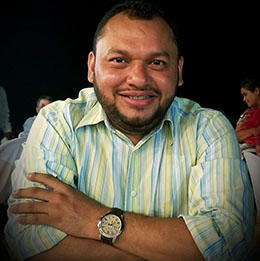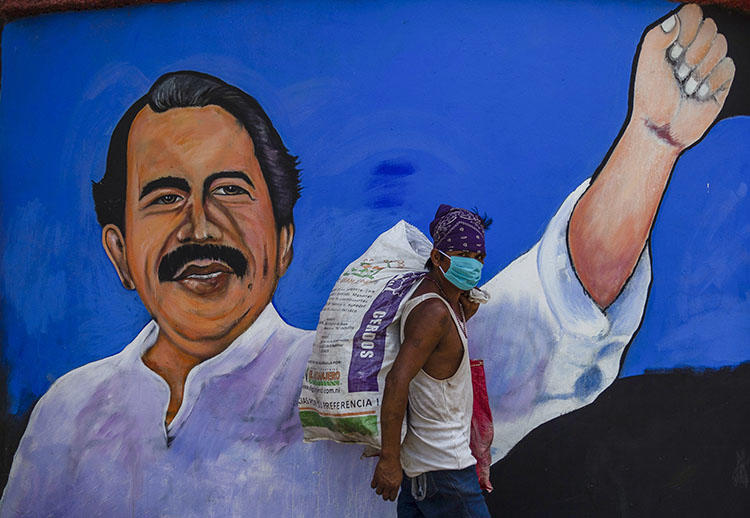Over the last two years–since protests and a government crackdown began in April 2018—Nicaraguan journalist Álvaro Navarro and his outlet, news website Artículo 66, have been a vital source of information for people looking for alternatives to the government’s discourse. During the COVID-19 pandemic, he and his team have been on the frontlines, reporting on the lack of governmental response and continued repression by authorities amid the crisis.
Nicaragua is the only country in Latin America that, as of late April, has not taken wide-ranging measures to fight the pandemic. According to official statistics from the Nicaraguan ministry of health, as of April 26 only 13 people in the country have tested positive for the virus and three people have died. The Pan-American Health Organization has expressed concern about the lack of an institutional response, and the Inter-American Commission of Human Rights has called on the Nicaraguan government to implement measures to protect the population.
Before he spoke at a press conference on April 15, President Daniel Ortega had not appeared in public for more than a month. His government has been dogged by questions about its response to the pandemic, according to news reports.

CPJ emailed Nicaraguan Vice President Rosario Murillo for comment about the Nicaraguan communication strategy amid the COVID-19 pandemic, but did not receive a response.
In a phone interview with CPJ on April 13, Navarro spoke about his experience covering the pandemic in a country where official data is not credible and where the risk of the virus combines with the risk of state harassment and persecution. This interview has been lightly edited for length and clarity.
Let’s talk first about context: what was happening before the pandemic began in Nicaragua? What type of coverage were you doing?
We had been covering everything related to the protests since April 18, 2018. Repression, murders, citizen complaints, etc., and the environment for journalists was very hostile, with constant threats and persecution. We took some [protective] measures like going out into the streets only when we had to, usually to cover protests, but there was a lot of police repression. In the last weeks before the pandemic, the police forcefully attacked small groups of protesters, and there were also fierce attacks on journalists.
The first weekend that the self-quarantine was established [on March 14], I went to make a transmission in my vehicle, in an area that has a lot of nighttime activity, with bars and clubs, to see whether the businesses were closed. Three motorcycles followed me, I had to take refuge in a hotel, and then a police patrol stayed in front of the hotel the whole night. I had to stay at the hotel for security. This is an environment of persecution, hostility, and threats, but still, we have continued working.
What changed with the pandemic?
There has been a change mainly because we have decided to protect ourselves, we are not in the streets anymore. What we have done is basically work from home, my colleagues are doing their jobs from their homes, the persecution has changed because we have changed the mechanism of our work.
How do the risks of covering the coronavirus compare with the daily dangers of reporting in Nicaragua?
Before, we were exposed to physical violence, to the risk of being attacked or getting arrested. Now we are at risk of getting infected with the virus without ultimately knowing what is going to happen to us, how the state is going to act, and how we are going to be treated. I am particularly concerned about what would happen if I got the virus — the same state that harasses me is the one that will take care of me. What security mechanisms do I have with the state? None, and [the pandemic] exposes us to an even higher risk than the political uncertainty.
How are you managing to do your job?
Reporting on the pandemic has been extremely complicated for all journalists, especially since there is an issue here in Nicaragua where there is no authorized voice besides the state. There is no private laboratory to inform us about the percentages of those affected, no university that can comment, everything is centralized in the Ministry of Health. They are the only ones who speak about patients, the origin of cases, etc. Private hospitals are prohibited from treating COVID-19 patients, and this makes it difficult for another voice to speak about this topic.
There is an enormous effort by some independent epidemiologists, but it is to be expected that the strength and credibility that their opinions may have is low because they have no access to statistics. When you have that and no credible official information, there is an enormous challenge, journalistically speaking. What we have been able to do is be very incisive with [covering] the state’s questionable positions that raise doubts; for example, the issue of the origin of patients with COVID-19 is a subject that has been handled in a confusing, erratic way. That allows us to try to explain to people and scrutinize the lack of precision in data and numbers. We have also reported on demands on social media [for more information] about the issue of tests, including more than 26,000 tests donated by the Central American Bank of Economic Integration.
Why is reporting on the pandemic in Nicaragua different from reporting in other parts of Latin America?
Because of the credibility of the authorities. Dictatorships like Cuba, for example, handle the information in a more transparent way than the Nicaraguan government. The Cuban ministry of health has said that they had three cases of people who were in Nicaragua and who brought the virus with them. Here they have maintained that there is no community contagion, but that Cuban declaration contradicts what Nicaraguan authorities say. When you find that contradiction between two governments who are allies, then you see that it is impossible to believe what the Nicaraguan government says.
Even countries that have taken drastic measures such as El Salvador have said that they do not trust the Nicaraguan account of cases. This government does not explain anything, they limit the information, and what they publish seems to be very sketchy, it makes it extremely complicated to report on.
What have been the most significant challenges during this time?
First, being able to continue reporting even amid this lack of institutional transparency. Second, being able to protect ourselves in a country where conditions are not reported, if we were in a country where conditions were clearly reported, perhaps we would feel a little more confident. Also, if there were any [preventative] measures, which a responsible state should have proposed, we would feel more secure, but this is not the case. We are forced to lock ourselves in because there is no institutional coverage that you can go to, we are banned from state events, so what we do is we collect opinions from independent doctors and check how the rest of the countries in the region are handling the pandemic to have some sort of standard.
How do you keep yourself and your sources safe?
My team and I work from home, practicing all the [safety] measures, not going out more than necessary, and establishing mechanisms for communicating digitally or by phone with sources. Some organizations have held press conferences online, and that has helped us a lot. It is challenging, but we have to do it for everyone’s safety.
How do you deal with and respond to misinformation about the virus?
The subject of fake news has been terrible because we do not have a credible official version and the state barely speaks. There is total secrecy imposed on hospitals. At the beginning there was a lot of information circulating from people who said things like there were people with symptoms here or there. We do not give credence to this information; instead, we try to approach [people with suspected cases], and contrast that with the official version from the government about that case. We report only what we can corroborate and usually ignore the information that circulates on social media.
What do you and other journalists need to be able to report freely?
We need institutions to open up, to be trustworthy for the population, to be reliable for journalists. To feel that the information they issue is what is actually happening, and to have access to professionals and technical experts on these issues. Another thing is for citizens to understand that the less fake news they share, the easier they make it for us. When they share something that is not verifiable, they put pressure on us.
